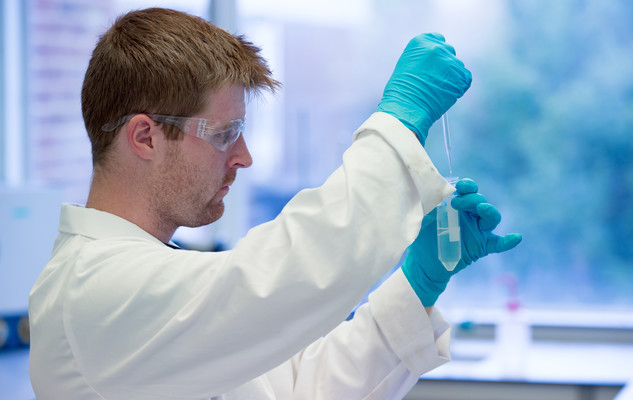What to do with a Chemistry degree
Explore the careers you might be interested in going into after studying a Chemistry degree.

What can you do with an undergraduate Chemistry degree?
Chemistry students can go into a variety of careers.
If you decide to study at Sussex, you'll undertake core modules before choosing from a range of option modules in year 3, allowing you to tailor your final year to your interests. You'll also practise your skills in laboratory sessions.
Already at Sussex? Visit our careers site.
What jobs can you get with an undergraduate Chemistry degree?
Jobs may include, but are not limited to:
- analytical, formulation, medicinal or process chemist
- chemical or geochemical engineer
- biotechnologist
- [jobs in] drug discovery and chemical industries
- environmental, forensic or materials scientist
- food technologist
- nanotechnologist
- patent attorney
- pharmacologist
- science writer
- scientific laboratory technician
- teacher
- toxicologist
- accountant
- banking
- IT consultant
- journalist
- management consultant
- marketer or salesperson.
If you haven’t studied a degree yet, and you’re considering a Chemistry course, you may want to browse our:
What do our Chemistry graduates do?
Hear from some of our Chemistry graduates about their careers beyond Sussex:
- Joseph Newcombe – Trainee Patent Attorney
- Hope Aitchison – Technology Consultant
- Emma Coakley – Trainee Chartered Accountant
- Adam Heins – Risk Advisory Manager
- Hester Beard – Post-doctoral Researcher
- Lisa Wootton – Spectroscopy and separations scientist, Evotech
- Charlotte Averre – Head of Science at international school
- Jack Hayes – Fixed income and derivatives specialist.
Skills
You may develop skills including:
- analysis and problem solving
- independent thinking
- working in a laboratory
- numerical and data analysis
- verbal communication
- teamwork and communication
- IT
- scientific integrity and ethics
- writing with scientifc rigour
- creative thinking
- commercial awareness
- entrepreneurship.
At Sussex, you can further develop your study skills by signing up for a range of workshops, tutorials and online resources.
Work experience and placements
You may be able to develop practical and technical experience during your degree through:
- laboratory work
- your final research project (if you do one as part of your course)
- applying for research schemes such as our Junior Research Associate scheme for undergraduate students.
At Sussex, during your degree, you can also choose to apply for one of the below:
- a professional placement
- a research placement (you may able to do a research placement if you are a high-performing student on a selected science course)
- an integrated placement if it is a requirement for a course.
This may help you gain skills and work experience before you graduate. You’ll be responsible for applying for and securing your placement. Find out more about placements and internships at Sussex.
You may want to look for work experience opportunities in your own time at organisations, such as:
- government departments
- research institutes and universities
- pharmaceutical and biotechnology companies
- companies working in agricultural chemicals, plastics, metals and petrochemicals.
What can you do with a Masters in Chemistry?
You might want to pursue a career in any of the above jobs. Or you could think about continuing your education further.
At Sussex, we offer research (PhD) degrees in the following subject areas:
You may then be able to go into an academic career, including roles such as:
- researcher
- higher education lecturer
- professor.
For more information about what to do after a Chemistry degree, see the website.
If you’re a current student, see more advice from our careers section.